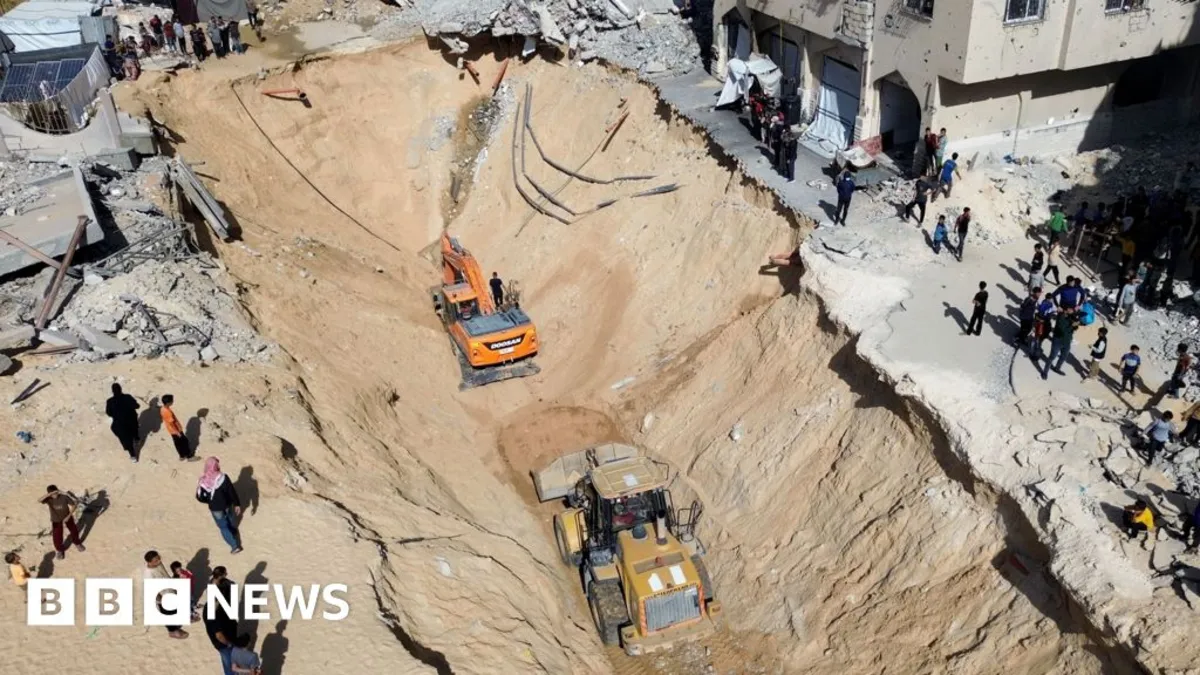
US Vice-President JD Vance has arrived in Israel as part of the Trump administration's ongoing efforts to reinforce the Gaza ceasefire agreement. His visit aims to encourage Israeli Prime Minister Benjamin Netanyahu to initiate discussions on long-term resolutions for a permanent cessation of hostilities with Hamas. Vance is accompanied by two special US envoys, Steve Witkoff and Jared Kushner, who previously played pivotal roles in negotiating the current ceasefire.
The timing of their visit follows a recent flare-up of violence on Sunday, which posed a significant threat to the 12-day-old truce. Reports indicate that a Hamas attack resulted in the deaths of two Israeli soldiers, prompting retaliatory airstrikes by Israel that killed dozens of Palestinians. This escalation underscores the fragile nature of the ceasefire and the urgent need for diplomatic engagement.
Former President Donald Trump is said to have dispatched Vance and his envoys to maintain momentum and advocate for the initiation of discussions on the second critical phase of his 20-point Gaza peace plan. This phase aims to establish an interim government in Palestinian territories, deploy an international stabilization force, withdraw Israeli troops, and disarm Hamas.
Israel has consistently stated that it will not engage in negotiations until Hamas returns all hostages it has taken. During his visit, Vance, Witkoff, and Kushner are also focused on ensuring that the ceasefire remains intact, which is based on the initial phase of the peace plan. However, US officials have expressed concerns that Netanyahu might abandon the deal and resume extensive military actions against Hamas, jeopardizing the fragile truce.
In a session with the Israeli parliament, Netanyahu emphasized that he would discuss the current security challenges and potential political opportunities with Vice-President Vance. He also revealed that Israeli forces dropped 153 tonnes of bombs on Gaza in response to what he termed a blatant breach of the ceasefire by Hamas.
The Israeli military holds Hamas responsible for an anti-tank missile attack that led to the deaths of the two Israeli soldiers. In retaliation, Israel conducted numerous strikes across Gaza, resulting in the deaths of at least 45 Palestinians, according to local hospitals. Despite these tensions, the Israeli military has stated that it intends to resume enforcement of the ceasefire, while Hamas has reiterated its commitment to the agreement.
On Monday, reports emerged of four additional Palestinians being killed by Israeli fire east of Gaza City. Israeli forces claimed that their troops fired upon individuals crossing the so-called Yellow Line, an area still occupied by Israeli forces.
In a statement from the White House, Trump reassured reporters about the ceasefire agreement with Hamas, asserting, "We made a deal... They're going to behave. If they're not, we're going to eradicate them." He emphasized that Hamas is aware of the consequences should they violate the agreement.
Meanwhile, Hamas's chief negotiator Khalil al-Hayya, currently in Cairo, affirmed that both Hamas and other Palestinian factions remain committed to the ceasefire deal. He expressed optimism that the war in Gaza is over, indicating that they are determined to fully implement the agreement.
In recent developments, Israeli authorities confirmed that Hamas had returned the body of another deceased Israeli hostage to the Red Cross in Gaza. The individual, identified as Tal Haimi, was killed during the initial Hamas-led attack on October 7, which triggered the ongoing conflict. So far, 13 of the 28 hostages' bodies held in Gaza have been returned since the ceasefire took effect.
Additionally, 20 living Israeli hostages were released last week in exchange for nearly 2,000 Palestinian prisoners. However, there is growing frustration in Israel regarding Hamas's failure to return all deceased hostages, with the Israeli Prime Minister's office stressing that the group must uphold its obligations.
The UN's World Food Programme (WFP) has highlighted the critical importance of sustaining the ceasefire to facilitate the delivery of essential humanitarian aid to Gaza. Since the ceasefire began, more than 6,700 tonnes of food have been delivered through 530 WFP lorries, providing sustenance for nearly 500,000 people for two weeks. However, the agency has struggled to meet its daily target due to limited operational crossings into the territory.
Currently, only two crossings - Kerem Shalom and Kissufim - are functional, with neither located in the northern region where food shortages are most severe. Despite the challenges, the WFP has successfully distributed some specialized nutritional supplements for children and pregnant women.
In the south, where food access has improved, there have been no incidents of looting of WFP supplies. Nevertheless, many residents are rationing their supplies out of anxiety about future deliveries. Following the recent violence, Israel temporarily halted aid deliveries but resumed them on Monday due to significant international pressure.
The ongoing conflict, ignited by the October 7, 2023 attack by Hamas that resulted in approximately 1,200 deaths and 251 hostages taken, has led to catastrophic humanitarian consequences. The Hamas-run health ministry reports that at least 68,216 individuals have died in Gaza due to Israeli military actions since the onset of hostilities.